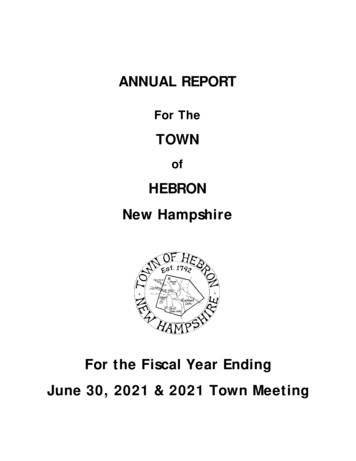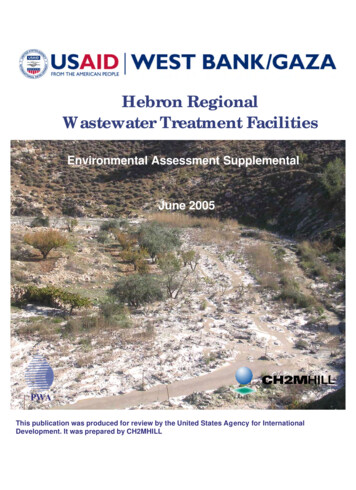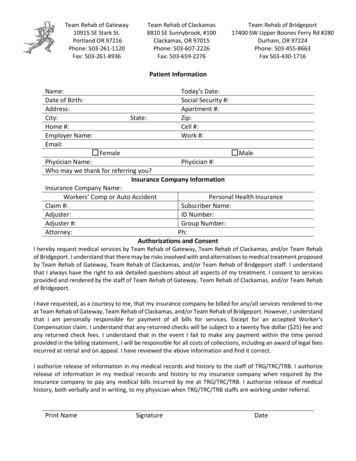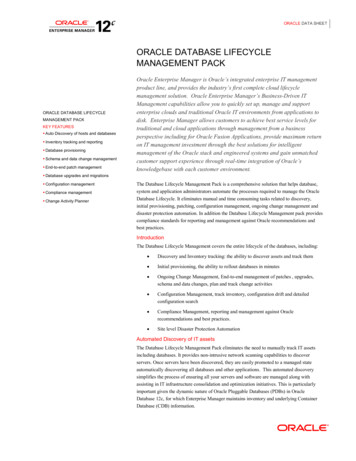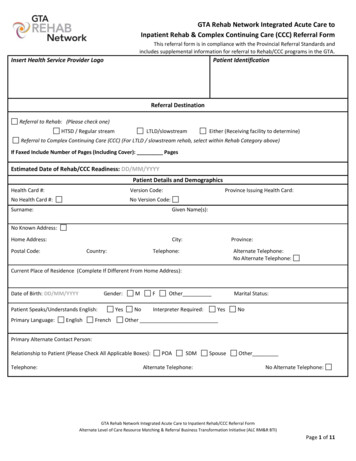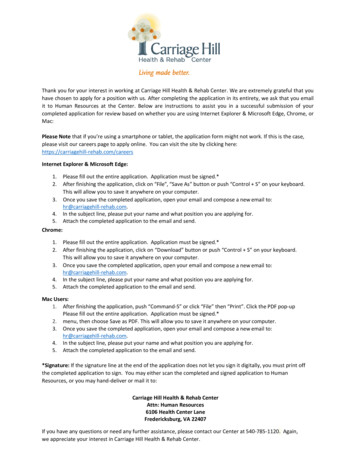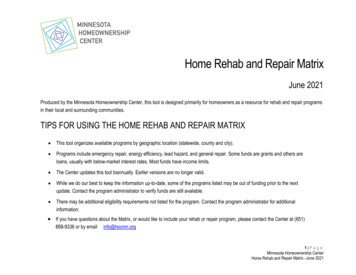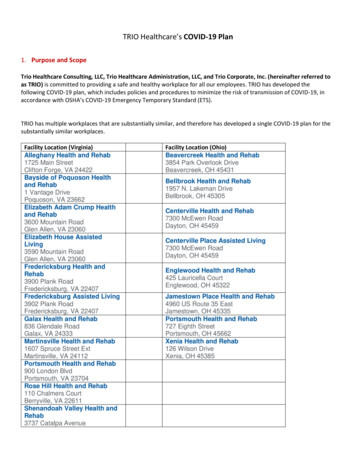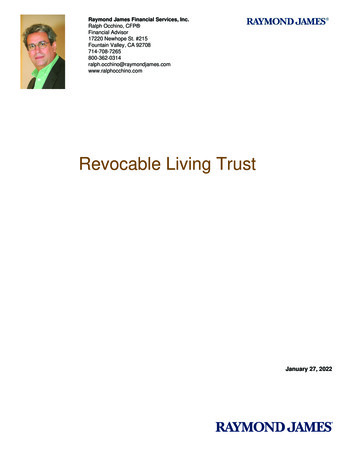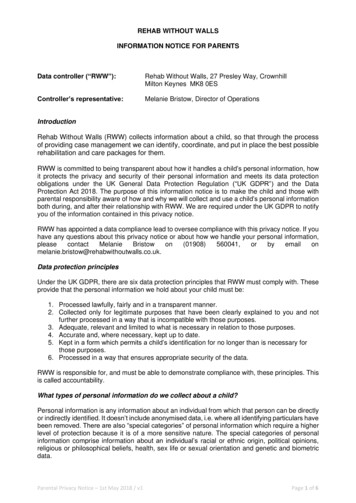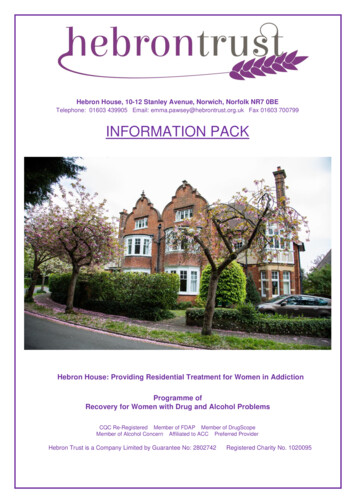
Transcription
Hebron House, 10-12 Stanley Avenue, Norwich, Norfolk NR7 0BETelephone: 01603 439905 Email: emma.pawsey@hebrontrust.org.uk Fax 01603 700799INFORMATION PACKHebron House: Providing Residential Treatment for Women in AddictionProgramme ofRecovery for Women with Drug and Alcohol ProblemsCQC Re-Registered Member of FDAP Member of DrugScopeMember of Alcohol Concern Affiliated to ACC Preferred ProviderHebron Trust is a Company Limited by Guarantee No: 2802742Registered Charity No. 1020095
Recovery Programme is oneof the very few places in the country where women only can access recoveryHebron Trust has been successfully working with women with drug/alcohol addiction since 1987 toprovide them with the life skills, support and resources to successfully resettle in the community drug oralcohol free.Specialist Treatment for WomenWe work with our clients to improve their wellbeing, encourage personal learning, encourageindependence and build confidence. To sustain independent living we address their housing, family,financial or legal problems. For some this means support to reintegrate with their families, for those whorelocate to settle in Norwich it is about enabling them to acquire paid employment so that they can achieveand sustain an independent life.Hebron Trust is a Preferred Provider for female only rehabilitation.Hebron HouseThe Trust operates from Hebron House offering quietaccommodation for ten women to live together safely in a smallsupportive community. They share household duties anddevelop skills they may have lost or for some it is an opportunityto learn new ones.The House is a modernised therapeutic facility for our clients,situated in a conservation area in walking distance of all cityamenities and public services in the heart of Norwich. TheNorfolk Broads, many beaches, country parks and river walksare all close by and used in the programme for leisure, walking,sailing and other activities.We accept referrals from all around the UK and offer anintegrated health and social care service. Our service operates7 days a week with 24-hour staff cover and we are supported bylocal GP practices, community services and other specialistprofessionals.We provide a highly structured and timetabled programmeincluding self–help techniques, one-to-one counselling,individual work and group therapy with mutual aid support. Weare NDTMS compliant.1
Outcomes for women who complete our programme Effective recoveryMaintained abstinenceHealthier lifestyleSustained independent livingRestored family relationshipsBack into education and employmentContributing positively to local communitiesIs Hebron House the right place for me?You are the only person who can answer this question. Do you want to stop drinking or using drugs? Doyou know that you need to help you to stop and stay sober and drug free?Hebron House is drug and alcohol free. This means that you will not be able to use drugs or drink alcoholand may be asked to leave if you do.In addition to alcohol, the most common drugs of choice are heroin, benzodiazepines, stimulants and clientsubstitute medication such as Methadone or Subutex.On admission, you will need to be drug and alcohol free – following an inpatient or home detox if required.Hebron House is a modernised building with a secluded garden, large rooms and a space for 10 womento live together. It provides a physically and emotionally safe place to make changes and live a drug andalcohol-free lifeWhat will happen whilst I am here?The structure of treatment, care and rehabilitation is flexible to support you in your own choices. You arefree to leave at any time and are encouraged to negotiate your own goals and length of stay. We findthat people who stay for more than 3 months are more likely to maintain a stable, drug and alcohol-freelifestyle after leaving and most women stay for 6 months in order to get full benefit from the programme.After a brief induction period, designed to help you settle into the daily routine, you will be allocated a KeyTherapeutic worker who will oversee all aspects of your placement.Hebron provides a variety of groups to help build your recovery which is centred round the 12 Steps.Therapeutic groups and psychosocial interventions using 1:1 counselling and CBT (CognitiveBehavioural Therapy) are provided individually and in mini-group.2
Groups on Relapse Prevention, Life Skills, Personal Development Workshops, Process Groups,Complimentary therapy and Community Meetings are programmed into the timetable with attendance atAA and NA meetings. Peer groups and mentoring is provided and opportunities to take up educationalcourses/training and/or voluntary work. Leisure based activities are offered such as swimming, art,needlecraft, badminton, fitness groups, shopping and weekend outings/days out.Structured one to one work will be with your Key Therapeutic worker who is your counsellor. This consistsof a mixture of counselling and teaching. There is also ‘homework’ to be competed between sessions.The purpose of counselling is to support and help you in day to day life without drugs or alcohol. Otherissues may also be included as agreed with you.Women and Drug or Alcohol problemsSome women with serious drug and alcoholproblems will not recover without access to aspecialised woman - only serviceWe have developed gender specific treatment and rehabilitation in recognition that women aredifferent from men and have radically different needs and expectations in recovery from severesubstance misuse. Some people who want to stop using drugs and drinking need extensive help to do soand will become increasingly ill and die prematurely without that help.The key features we offer are: Small size – up to ten residentsHigh staff ratioExtensive use of 1:1 workingSupportive and affirming communityBased on openness, honesty andtrustFocus on relationshipsFocus on personal developmentIndividual and flexible regimeComfort and informalityPersonal private spacePrimary careExploring spiritualityContinuing contact and aftercareAlthough Hebron Trust is a Christian based service most women who come are not practising Christiansand we do not pressurise people into making any kind of religious commitment. We are committed toequality of opportunity and welcome diverse applications from women of all sectors of the community3
Placement considerations: Out of control drug and alcohol useLong term drug and alcohol useDeteriorating physical healthMental health service episodesChildren at riskCo-existing eating disorders Self-harm or suicide attemptsChaotic lifestyleRepeated offendingUnsatisfactory housingHistory of physical or sexual abuseFailure of previous interventionsA mixed setting not appropriateTime spent in custody or careHebron House will not accept clients with: Arson convictionsLong term psychiatric maintenance medication which seriously impairs their engagement with thepsycho-social processA history of violence against childrenA history of violence against adults which is not drug or alcohol relatedSerious co existing physical or mental health problems that would make it unsafe for the client to behere.Residents are responsible for playing their part in the household to the best of their ability, keeping tothe rules and any personal restrictions they have agreed to and cooperating with the activities andstructure of care.Residents have the following rights: Always treated with respectNo discriminationRespected confidentiality4
Counselling rooms for one-to-one counselling and individual therapyTo see written informationNegotiate own goalsFreedom from abuseNot detained against their willTo make suggestions or to complainOur staff Code of Practice sets out standards of behaviour and the terms of staff availability for attentionto and support of residents. The staff team are professionally qualified counsellors or care practitionerswith specialist work related and substance misuse training. We are supported by Life Skills coaches andtrained volunteers.After detoxification and changes from reliance on drugs and alcohol, many women are able to tackle theirissues and to progress in overcoming the problems they face.This change takes place within a network of relationships which include Hebron graduates, volunteers,current residents and the staff team. Every resident receives specialist 1:1 counselling and CBT linkedwith therapeutic approaches of motivational interaction and transactional analysis and takes part in awide range of therapeutic groups: 12 Step Groups Relapse PreventionArt provides opportunity to explore creativityLife SkillsAnger ManagementConfidence BuildingHidden SkillsCognitive Behavioural Therapy (CBT)Relationships WorkshopsProcess GroupsNutritionParenting and family/carer supportRecreational/exercise groups such as, badminton, swimming, keepfit, shopping, group outingsComplimentary therapies such as art, relaxation, EFTPeer supportMutual Aid As recovery progresses, women are encouraged to choose groups outside such as NA, AA, CA, OA andshift their involvement to external activities such as voluntary work or education/training.5
The large garden space is utilised for leisure and therapeutic activity with garden furniture inquiet places for relaxation, reflection and counselling sessionsCare StructureAt Hebron Trust we cater for clients with the following characteristics: Women aged 18 years and overResponsible for childrenAssessed for residential interventionDependant on opiates, alcohol, tranquilisers, stimulants, substitute medicationor a combinationServices offered:Integrated Health and Social Care to: Minimise further harmMeet primary health needsRestore healthy sleep, eating and exercise patternsConsider food and nutritionEstablish impulse controlAddress psychological disturbanceManage anxiety and emotional distressManage anger situationsFacilitate confidence in domestic competenceEncourage self-assertionDevelop life skills and functioningSupport parenting and other significant relationshipsRecognise unhealthy relationships and break unsafe, abusive relationship cyclesBuild confidence and self-esteemBe appreciated and learn to appreciate othersExplore co-dependency, responsibility and saying ‘no’Begin to explore and resolve family-of-origin issuesInvestigate The 12 StepsFind alcohol and drug free support network – Mutual Support GroupsDWP Benefits and Welfare adviceHelp with finances/debts and advocacyIncrease learning – education and training coursesEngagement in Voluntary workSupport for housing needs6It is oftenthe casethatwomenreceivingtreatmentfor drugandalcoholproblemsareseparatedfrom theirchildren
As an abstinent programme harm minimisation is addressed as BBV education, Sexual health screening,Hep C and B vaccination, Family guidance, Advice on overdose prevention, Referral to sector helpingagencies.Care management and review:Hebron Trust Care Planning is the process of setting goals and interventions based on the needsidentified for our clients. We assess and plan with the client how to best meet those goals with structured,specialist drug/alcohol treatment interventions.Each resident is allocated a female key therapeutic worker who helps devise her care plan and initiallytakes primary responsibility for its delivery. This responsibility moves to the resident herself as herrecovery progresses. The therapeutic worker also carries out her structured counselling in 1:1 sessions.There are two of these formal sessions each week until after the second phase assessment, then oneeach week until the completion of the programme.The structure of treatment, care and rehabilitation is flexible to support clients own choices. They are freeto leave at any time and are encouraged to negotiate their own goals and length of stay which relates toindividual assessed need, progress in achieving treatment goals and by agreement between the purchasingauthority and the resident concerned.Clients are required to work through a set syllabus of study and therapy common to all in the first Stage ofthe programme. Stage 2 is more choice-based. We increase group facilitation and source teaching andexternal learning courses as required in individual care plans.7
While in Hebron I had the chance to put life on pause .take a good long look at mybehaviour and work things out’‘My Key worker was like a mother to me My sessions were honest and non-judgemental. I feltsafe'‘This programme has opened me up to a whole new way of thinking and being’‘I’ve discovered me’‘Hebron has cleared the attic out of my head’“I understood from the start of all these groups that my way tofreedom was going to be a long process and I took it on the chin!”‘A great programme, well run and well organised’Review of progress: Residents have a 1:1 ‘regular review’ with the care manager. Residents carry out a comprehensive self-assessment at the end of a phase of care to identifytheir objectives for the next stage. The process also involves the staff team. A report isproduced for the referring authority at each Phase end. A three-monthly review is carried out with the resident and referrer, including a visit from thereferrer to Hebron House, based on a written report from us. Aftercare review is monthly with support worker and client.8
Programme StructureIt is often the casethat whilethe main problem issubstancemisuse there aremultiple and complexproblems for womenthat lie behind theirdependencyThe programme is structured in two stages with flexibility according tothe client’s own needs and goals. Resettlement is structured into theprogramme with an appropriate support plan set up for all clients.Aftercare service is provided formally to clients who relocate to Norwich.We offer 33 therapeutic activities in our care programme, which areworked individually or in groups, and these complement each other toaddress holistically the needs of our clients. Key concepts we work arerespect, trust and safety and the importance of healthy relationshipsexplored in a series of workshops. Honesty, openness and willingnessare the key principles we encourage for a successful recovery.Placements can be 12 or 24 weeks depending on client needs. Longer placements can be negotiated ifrequired. Shorter placements may be considered in exceptional circumstances.First Stage - 12-week programme in two phases is heavily restricted to allow clients to settle anddetach from the outside world then provides opportunity to move towards independence andresponsibility. This would suit women with less complex issues, who have access to the provision ofcontinued aftercare support in their home area: Tailored care planIntegrated health carePersonal therapeutic key workerOne to one counselling sessions per weekDaily programme of group therapyCovering Steps 1, 2 and 3Written workLife skillsRelationships Course by a specialised women’s Life Coach orAssertiveness and confidence building training by a specialised women’s Life CoachSport and leisure activitiesAssistance to address financial and/or debt problemsAttendance at mutual aid support groupsLiaison with funding agencies and involved relevant professionals to plan safe departure andtransition into their home community after completionSecond Stage - 12-week programme as phase 3 works towards re-integration to society andindependent living. This would suit women who have multiple complex issues that lie behind theirdependency and have completed our first stage and can access continued aftercare support in their homearea or may wish to relocate. Voluntary work is available in the 2nd stage only: As above Improved physical health and/or mental health ready to tackle deeper personal issuesWork placements in house and in the wider community to prepare for abstinence basedlivingVoluntary work and/or educational courses to develop skills, learn new skills, build confidenceand ability to interactWork Steps 4 and 5 within a safe, supported and trusted settingAssistance to address financial/debt problems and will learn to budgetVisits to families, etc and overnight stays at weekendsResettlement planning
Relocation assessmentAftercare - 12 week programme Women successfully completing our 6 month programme who eitherlive or relocate to the Norwich area are offered with an aftercare support package with move-onaccommodation: Visiting support24 hour phone helpDIY skills /decoration/ sourcing furnitureStructured day programmeWeekly return visits to Hebron HouseOne to one counselling with key workerRelapse preventionLife skills group workGOALS trainingBenefit adviceHealth careSocial eventsVoluntary workPeer mentoringSupported HousingEmployment accessMutual aid support groupsWe provide our ownsupported accommodationatChapel House for 12weeks and work with aworkless/homelessinitiative private sectorleasingscheme with NorwichCityCouncil for move-onaccommodationFor those who return to their home area we make links with their local support groups, access housing ifrequired and set up contacts before they return home. We provide informal aftercare support withtelephone contact. Visiting support can be provided at a cost.Phased CareStage 1 - Phases 1&2Phase 1: Assessment and Primary Care (6 weeks)Goals To completely withdraw from drugs and alcohol To settle into the household routine within the community To cope with each day’s demands without the use of drugs or alcohol, self-harm or compulsivebehaviour To do whatever work is given to you, such as house-cleaning, meal preparation or written work To begin to deal with any family, financial or legal problems with our help To begin to handle any confrontation that may occur and to be more open and honest To work steps 1 and 2 of the 12 StepsRestrictions No sending or receiving of post for the first 2 weeks. All post thereafter should be opened in front of amember of staff No making or receiving personal phone calls, except from children and professionals (ie social workeror solicitor) in the first 4 weeks. After 4 weeks you may use the resident’s pay phone at evenings andweekends No visitors except from young children and professionals When you go outside the house, a member of staff will accompany you10
AssessmentAt the end of this phase you can fill out an assessment form and meet with the staff to see if you havereached the goals set out and are ready to move onto Phase 2. At this time restrictions may be removedor modified to suit your needs.Phase 2: Settled (6 weeks)Goals To demonstrate a real commitment to your own recovery programme and to the other people in thecommunity To set and achieve short and medium term goals in an honest way To handle relationships within the household by sorting out problems and conflicts in an acceptableway To take on more responsibility in the house, other than daily household chores, according to yourpreference begin to relate to people outside the house To begin investigating various options for part-time voluntary work or study in Norwich To attend a local church if desired To work steps 3 and 4 of the 12 StepsRestrictions You will already be able to send and receive post and make personal phone calls You may now invite visitors by arrangement with us You may leave the house so long as you have permission and agree to keep the policy we work outwith you All purchases must have a receipt As you get ready for Phase 3, you may negotiate an overnight or weekend visit away, if a day visit isnot possible or if you are expecting to leave at the 12-week point.AssessmentAt the end of this phase you can fill out an assessment form and meet with the staff to see if you havereached the goals set out and are ready to move onto Phase 3. At this time restrictions may be removedor modified to suit your needs.Stage 2 - Phase 3: Responsible (open ended)Goals To increase your ability to function well at- interpersonal relationships- coping with stress and handling personal problems- demands of specific work situations- use of spare time- living within a budget- self-control and self-discipline To demonstrate continuing and positive recovery from addiction, based on personal spiritualexperience: that you have a new understanding of yourself and of others and you are clearer aboutthe meaning, value and direction of your life To set medium and long term goals and being to move towards them To begin part time voluntary work and / or part time study To handle authority in a mature way To continue to work through the 12 Steps
RestrictionsThese will be relaxed as you become more involved in outside activities. This means you will haveincreased freedom to come and go and more control over your personal moneyAssessmentOne or two weeks before your planned departure, we will ask you to complete a departure assignmentincluding plans for your future.12
House Rules1.No drugs or alcoholYour residence at Hebron House is conditional upon you staying clear of alcohol and of all other moodaltering chemicals.2. No violence or threats of violence towards yourself (ie intentional self harm) or violence orthreats of violence towards others3.Keep to the daily timetableResidents are expected to be up, washed, dressed and downstairs by 8 am Monday to Friday. Choresmust be completed and residents must have their breakfast by 9.10 am, when the first group starts.Morning medication is given out between 8 am and 8.15 am. Residents are allowed a lie in at theweekend, but morning medication must be taken by 9.15 am.Baths and showers should only be taken first thing in the morning – between 6 am and 8 am – or in theevenings between 7 pm and 10 pm. Residents should be working to the daily timetable and not be usingthe shower or bath during the day.4.Do, to the best of your ability, whatever work is given to you to doThis will include taking part in the running of the house, cooking, washing up, cleaning and other choresand completing work-sheets and written work to do with the Recovery Programme.5.Co-operate with the Rehabilitation ProgrammeResidents are expected to participate in all organised household duties and therapeutic activities. Theseinclude attendance at daily readings, one to one sessions and all other groups. This also includesswimming whilst in Phase 1.6.SmokingSmoking is only allowed outside the house. Nicotine dependence is another addiction and seriouslydamages your health. Therefore we ask that you try to limit yourself to approximately 10 cigarettes a dayor up to 50 gm of tobacco a week. This is also to help you keep within your DWP weekly personalallowance. We reserve the right to enforce a reduction in nicotine consumption if you continue to exceedthe suggested limits.7.TV, music, etcTV and music should only be on downstairs in the communal areas between 7 am and 9.10 am, between1 pm and 2 pm and after 5 pm during the week. The volume should be kept low and the TV should beturned off when the room is empty.Music may be played in the bedrooms at other times providing the volume is low. Radios must be turnedoff when leaving your room. Personal MP3 players, radios and CD players are allowed in bedrooms andat a low volume during certain times of the day (i.e. same time as the TV during weekdays).Other restrictions on music, television and radio may be necessary on occasion because of therequirements of rehabilitation and community living.
8.AuthoritySerious or persistent breach of the house rules or failure to co-operate with rehabilitation will result inour reviewing with you the suitability of your staying at Hebron House. Normally we will follow the 12guidelines set out in the Trust's disciplinary procedure, but we reserve the right to summarily dischargeany resident and to terminate her license agreement for: violence, threats, aggressive behaviour, self harm or deliberate damage to propertyusing unauthorised drugs/medication or alcohol; supplying, giving or exchanging drugs or alcoholwith another residentharassment or abuse of residents, staff or visitorstheft, criminal activity or fraud - DWP or Hebron Trusta serious or persistent breach of the house rulesWe ask that you accept the authority and discipline of the staff team to keep order within the house andto help with rehabilitation. We are committed to keeping a drug-free house and to maintaining anemotionally secure environment within which you can risk change and find new ways of coping with stressand personal relationships.9.RelationshipsWe do not allow the forming of sexual or exclusive emotional attachments during the programme. We donot allow ‘drug talk’ or sharing details of your past drug usage or criminal behaviour with other residents.This also includes talking excessively about eating, calorie counting, weight loss as eating disorders areanother form of addictive behavior. We do not allow visiting other residents in their bedrooms.10.Personal PossessionsBecause of limitations of space, please bring with you no more than one large and one small suitcase (orthe equivalent). Your belongings will be searched when you arrive. While you are resident with us wereserve the right to search your room and/or your belongings in your presence if we suspect you haveused or are in possession of drugs or alcohol. We cannot accept responsibility for the loss or damage toyour property while you are resident with us nor accept responsibility for any possessions you may leavebehind when you leave.11.Body Piercing and TattoosWe understand and respect that residents may have piercings or tattoos upon entering Hebron Trust.However, whilst at Hebron Trust, we will not allow residents to have any new piercings or tattoos –including re-piercing of old holes and the removal of tattoos. These things can be undertaken when theresident has completed the programme and left Hebron Trust.Programme RestrictionsThe purpose of these is to help you regain control over addictive and compulsive behaviour, to protectyou from outside communications which may undermine your recovery and to help you to fullyconcentrate on your recovery from addiction with the minimum of distractions.Please see these restrictions as a kind of temporary "scaffolding" inside which necessary repair work isgoing on during the early stages of your recovery. There are two basic areas in which restrictions applyto all residents. These are:
1.Post, phone calls and outside activitiesa.Do not send or receive personal letters during first 2 weeks.b.Do not make or receive personal phone calls during first 4 weeks.If you have to be in contact with your Solicitor, Probation Officer or Social Worker because of legal orfinancial problems or urgent family matters, such calls will be made in the presence of a staff member.We will also contact the GP on your behalf should the need arise or if you request an appointment. Youwill also be able to have regular phone contact with your children according to an agreed schedule. Nouse of mobile phones.During first 6 weeks when you go outside the house, you must be accompanied by a member of staff.2.FinancesWhile you are resident at Hebron House you will not have direct access to personal money. This will beunder our control and supervision, but you may see and will be kept up to date on your financial record.The petty cash board must be signed by you whenever you take money out. It will also be countersignedby a staff member. If you are taking your own money, you will also need to sign this out of your Resident’sAccount. Any change will be paid back into your account.Your fees are paid directly to Hebron House. You may be required to make a client contribution towardsyour care and this should be assessed prior to your admission. This amount will be taken out of yourbenefits so it is important to tell your funder all of your incomings and outgoings when they undertake a‘financial assessment’ with you.Money ManagementIt is an essential life skill to be able to budget and live within our means. Many people who have been inactive addiction have debts or other money problems. Hebron Trust will therefore reasonably guide andoversee your spending whilst you are with us.During your first week with us you will meet with a resettlement worker to look at any benefits or debtissues you may have in order to help you to address these practically.Whilst at Hebron House your food, cleaning and laundry products are provided. You will have statutory‘pocket money’ per week. Your personal allowance is set by DWP. This comes out of your own moneyand is to cover essential personal toiletries and cigarettes or tobacco.You may on occasion need to make additional purchases beyond the personal allowance set by DWP.You will need to pass requests for additional spending through the staff team meeting. You will need toprovide money to meet the costs. This enables us to challenge unnecessary spending and provide youwith an opportunity to look at your spending habits in order to develop a realistic and manageablefinancial lifestyle.Prior to your placement your funder will have assessed your financial situation and will have decided ona client contribution towards your placement. The amount is entirely at the funder’s discretion and isbased on your personal incomings and outgoings.15
Room ShareHebron House can take up to ten residents. There are eight bedrooms which comprise six single roomsand two double rooms.You may be asked to share a room at some point during your stay at Hebron, usually on admission whenyou first arrive. This would not be for the whole placement and many residents have gone through theirentire six month stay without sharing.We want to be able to offer a place to every woman that applies to come to Hebron and in order for us todo this we need to have the facility to offer all ten bed spaces. We need you to be willing to share a roomif required at some point in your stay at
Hebron House, 10-12 Stanley Avenue, Norwich, Norfolk NR7 0BE Telephone: 01603 439905 Email: emma.pawsey@hebrontrust.org.uk Fax 01603 700799 . Hebron House is drug and alcohol free. This means that you will not be able to use drugs or drink alcohol and may be asked to leave if you do.
